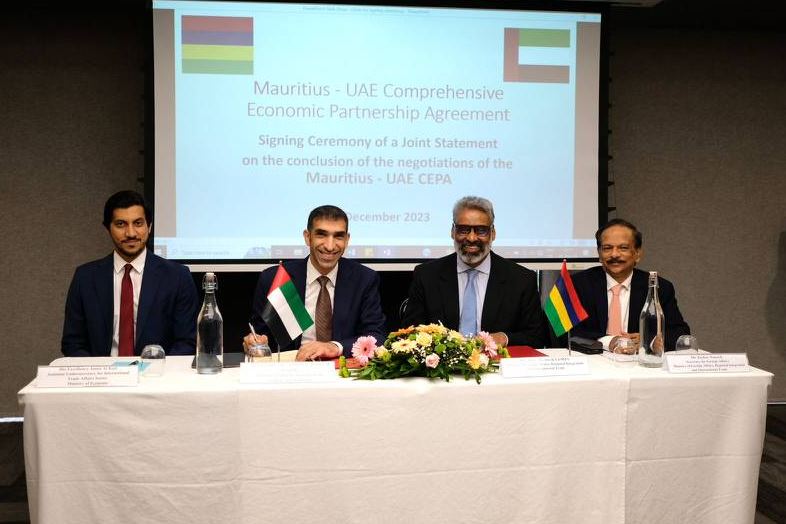The UAE and Mauritius have concluded the terms of a Comprehensive Economic Partnership Agreement (Cepa) to boost trade and investment flows and private sector collaboration.
It is the first Cepa deal concluded by the UAE with an African nation.
The conclusion of negotiations, which came four months after the first round of talks, was confirmed by the signing of a statement in Mauritius by Dr Thani Al Zeyoudi, UAE Minister of State for Foreign Trade, and Maneesh Gobin, Minister of Foreign Affairs, Regional Integration and International trade of Mauritius.
Once in place, the agreement will accelerate growth in non-oil trade between the UAE and Mauritius, which stood at $63.1 million in the first half of 2023, with opportunities greatest in chemicals, metals and petroleum products sectors, according to a statement from the ministry on Saturday.
In 2022, bilateral non-oil trade grew 27 per cent to $148.9 million and this agreement signals more to come, Dr Al Zeyoudi said in a post on social media platform X on Friday.
“Strategically located in the vital Indian Ocean and with a growth-orientated economic vision that matches our own, Mauritius is a welcome and valued partner in the UAE’s Cepa programme and our efforts to maximise bilateral opportunities borne from open, rules-based trade,” Dr Al Zeyoudi said.
“With the potential to add fully 1 per cent to the Mauritius economy by 2031 and enhancing the UAE’s gross domestic product by 1.2 per cent in the same period, a UAE-Mauritius Cepa offers considerable benefits for us both – it will do so by not only boosting trade flows, but creating new pathways for strategic investment, private-sector and academic collaboration, and SME support.”
The UAE is working towards signing 26 Cepas as it seeks to attract more investment and to diversify its economy.
It has signed Cepas with India, Israel, Turkey, Indonesia, Cambodia and Georgia, each of which are designed to boost economic activity and secure supply chains. The first four agreements are already in effect.
The UAE is seeking to expand trade with partners as it pursues its target of Dh4 trillion ($1.09 trillion) in foreign trade by 2031 and double the size of its economy by 2030.
The UAE’s non-oil foreign trade hit a record Dh1.24 trillion in the first half of 2023, up 14.4 per cent year on year.
Overall, Cepas are expected to add about 2.6 per cent to the UAE’s economy by 2030, Dr Al Zeyoudi has said.
The UAE-Mauritius Cepa will take effect on ratification by both sides, the statement said.
“It is expected that the Cepa will further improve the business climate and remove any impediments to trade in goods, trade in services and investment flows,” Mr Gobin said.
“Furthermore, the first Cepa between the UAE and an African country will surely play a pivotal role towards the establishment of joint ventures, movement of professionals and in the strategy of both countries towards their participation in regional value chains.”
The Cepa will cover trade in goods and services and investment facilitation, among others, the statement said.
The Mauritius economy posted 8.5 per cent GDP growth in 2022, the fastest in 35 years, it added.
The services sector, which accounts for 67 per cent of Mauritius’s GDP, offers “vast potential for UAE businesses specialised in telecommunications, computer and information services, travel, transport and financial services and who are looking to expand into Africa”, according to the ministry.
The deal is also expected to drive foreign direct investment into FinTech, healthcare and tourism sectors, the ministry added.

